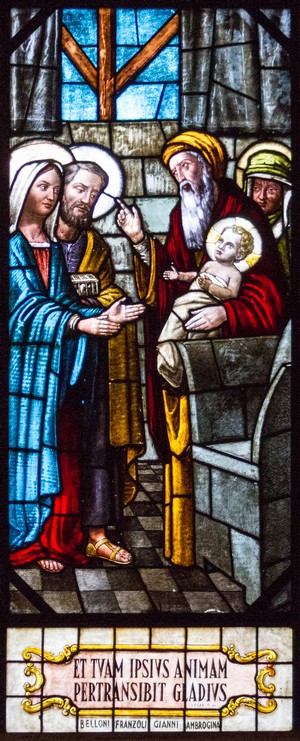Luke 2:22-40
From this text we focus on one part of Simeon’s prophesy in verses 34-35.
Then Simeon blessed them, and said to Mary His mother, “Behold, this Child is destined for the fall and rising of many in Israel, and for a sign which will be spoken against “(yes, a sword will pierce through your own soul also), that the thoughts of many hearts may be revealed.”
“Simeon blessed them”
Verse 34 says, “Simeon blessed them.” From the prior verse we know this refers to both Joseph and Mary.
Simeon “said to Mary . . .”
Immediately the text continues, “and [Simeon] said to Mary His mother.”
Simeon has just spoken to both Joseph and Mary. He blessed them both. Then immediately he shifts his address to Mary only. Joseph still is there and can hear, but Simeon is not saying these next things to him.
In his words to Mary, Simeon is looking forward to the crucifixion of Christ and his life of suffering on his way to the cross.
Christ has not come in glory. He has come for crucifixion, and He lives under the cross. Because of this, Simeon prophesies four things: many in Israel will fall and rise; Jesus will be spoken against; the thoughts of many hearts will be revealed; and a sword will pierce through Mary’s own soul.
But Joseph will not see these things because he will die before Jesus begins his public ministry. So, when prophesying these things, Simeon turns from addressing both Joseph and Mary to addressing Mary only.
Mary a widow
At the cross, Mary will be a widow. Because her husband has died, her first born Son has been caring for her as required of him under the law of Moses. At the cross, Jesus is about to die, which would leave Mary destitute. We see Jesus obey the law of Moses again by making arrangement for his mother’s care, in John 19:25-27:
Now there stood by the cross of Jesus His mother, and His mother’s sister, Mary the wife of Clopas, and Mary Magdalene. When Jesus therefore saw His mother, and the disciple whom He loved standing by, He said to His mother, “Woman, behold your son!” Then He said to the disciple, “Behold your mother!” And from that hour that disciple took her to his own home.
Jesus fatherless
This saying of Simeon foreshadows also the fatherlessness of Jesus. From the human perspective, by outward appearance, Joseph was Jesus’ father. In truth, Jesus is the Only Begotten Son of the Father in heaven. But at the cross we hear this in Mark 15:33-34:
Now when the sixth hour had come, there was darkness over the whole land until the ninth hour. And at the ninth hour Jesus cried out with a loud voice, saying, “Eloi, Eloi, lama sabachthani?” which is translated, “My God, My God, why have You forsaken Me?”
Jesus will lose his earthly father, and He will lose his heavenly Father. Why? Because as Isaiah says in 53:6a, “the LORD has laid on Him the iniquity of us all.” On the cross Jesus bears our sin and suffers the penalty for sin in our place.
Rising and falling
Because of the cross of Christ Simeon says, “this Child is destined for the fall and rising of many in Israel.” What is this fall and rising?
The fall is by unbelief in Christ and his cross. The rising is by faith in Christ and his cross.
Jesus is the chief cornerstone, but by unbelief and self-righteousness, he becomes a stumbling block, and people fall. Paul says in 1 Corinthians 1:
For Jews request a sign, and Greeks seek after wisdom; but we preach Christ crucified, to the Jews a stumbling block and to the Greeks foolishness, but to those who are called, both Jews and Greeks, Christ the power of God and the wisdom of God.
Again, Paul says in Romans 9:31-33,
but Israel, pursuing the law of righteousness, has not attained to the law of righteousness. Why? Because they did not seek it by faith, but as it were, by the works of the law. For they stumbled at that stumbling stone. As it is written:
“Behold, I lay in Zion a stumbling stone and rock of offense, And whoever believes on Him will not be put to shame.”
One group is offended by Christ, they stumble over him, and fall. The other group, despairing of their own righteousness, convicted of their sin, put their confidence in Christ, the Lamb of God who takes away the sin of the world, and they will not be put to shame. He raises them up, as Paul says in Ephesians 2:4-9
But God, who is rich in mercy, because of His great love with which He loved us, even when we were dead in trespasses, made us alive together with Christ (by grace you have been saved), and raised us up together, and made us sit together in the heavenly places in Christ Jesus, that in the ages to come He might show the exceeding riches of His grace in His kindness toward us in Christ Jesus. For by grace you have been saved through faith, and that not of yourselves; it is the gift of God, not of works, lest anyone should boast.
This Child is for a sign which will be spoken against
Simeon says, “this Child is . . . for a sign which will be spoken against.”
Near the beginning of his public ministry, Jesus enjoyed some popularity with the common people, but this soon turned to opposition. If we were to look at all the instances recorded in the Gospels, we would be here all day. People said He was a sinner, glutton, drunkard, blasphemer, was insane, and had a demon.
In his hometown, people ridiculed Jesus for his family’s low station. Authorities ridiculed him for lacking education. A Samaritan village refused him lodging. The Gadarenes begged him to leave their region. “Not even his brothers believed in him.” (John 7:5) His own family “went out to seize him … saying, ‘He is out of his mind.’” (Mark 3:20-21)
In his hometown of Nazareth, Luke 4:28-29 says:

So all those in the synagogue, when they heard these things, were filled with wrath, and rose up and thrust Him out of the city; and they led Him to the brow of the hill on which their city was built, that they might throw Him down over the cliff.
When Jesus taught that He is the living bread from heaven and began to teach about the Sacrament of the Altar, John 6:66 tells us, “From that time many of His disciples went back and walked with Him no more.”
In John 5:18, “Therefore the Jews sought all the more to kill Him, because He not only broke the Sabbath, but also said that God was His Father, making Himself equal with God.”
In Matthew 12:24, “The Pharisees … said, ‘This fellow does not cast out demons except by Beelzebub, the ruler of the demons.’”
In John 10:20, “many of them said, “He has a demon and is mad.” A few verses later, when Jesus says, “I and My Father are one.,” verse 31 tells us “Then the Jews took up stones again to stone Him.”
Three times Jesus predicted that He must suffer many things, be rejected by the elders and chief priests and scribes, be betrayed, be killed, and be raised the third day.
This Child was spoken against by false witnesses in multiple sham trials and by the mob crying “Crucify him.”
The thoughts of many hearts may be revealed
Simeon said these things will happened so “that the thoughts of many hearts may be revealed.” Jesus and his cross are the touchstones that tell what is in a heart.
Most people will speak of morality. Most people will speak favorably for the church. At Christmas, most people will speak about peace and good will towards men, after a fashion.
But listen for what people say about Christ himself. Listen for what they say about his cross. When and where do you hear either of these: Christ or his cross?
This shows whether contrition or self-righteousness is in the heart. This shows whether confession or presumption is in the heart. This shows whether faith or despair is in the heart.
Jesus said in Matthew 12:34, “out of the abundance of the heart the mouth speaks.” Paul says in Romans 10:9-10,
that if you confess with your mouth the Lord Jesus and believe in your heart that God has raised Him from the dead, you will be saved. For with the heart one believes unto righteousness, and with the mouth confession is made unto salvation.
A sword will pierce through your own soul also
By the word “also,” Simeon includes Mary in the effects that Christ and his cross will have. He says to Mary, “Yes … also.” “Yes, a sword will pierce through your own soul also.”
No doubt this refers to the suffering of a mother for her son when the world attacks him with cruel injustice.
But there is something more.
Mary knows that it is not only the world acting at the cross. She knows that God gave his Only Begotten Son to die for us. She knows that it is not simply the Jewish Sanhedrin, the Jewish King Herod, the Roman Governor Pilate, and the mob crying “Crucify him,” that brought her son to this. Mary knows it is her own sin and the love of Christ for sinners that brought her firstborn son to the cross and to his life of suffering on his way to the cross.
Here is the sword piercing through her own soul, the sword of her own sin, the sword of the convicting Word of God. As Paul says in Ephesians 6:17, “the sword of the Spirit, which is the word of God.” This sword for Mary is the same sword of the cross that pierces the soul of every penitent sinner.
This piercing of the sword through Mary’s own soul is described in Hebrews 4:12-13:
For the word of God is living and powerful, and sharper than any two-edged sword, piercing even to the division of soul and spirit, and of joints and marrow, and is a discerner of the thoughts and intents of the heart. And there is no creature hidden from His sight, but all things are naked and open to the eyes of Him to whom we must give account.
Mary shows us the way of contrition for sin, and with contrition she also shows the way of faith in Christ. Our text says that Joseph and Mary marveled at the things spoken of Jesus by Simeon. As Martin Luther explained in one of his sermons on our text, had they not believed what was spoken, they would not have had reason to marvel. But because they did believe, because when they heard the Word of the Lord, they had faith, then the saying of the Word was something to marvel at.
These two parts of repentance – contrition and faith – shine through our text. The Holy Spirit uses the sword of the spirit, the Word of the cross, to create contrition and faith. Let this sword pierce through your soul also.




